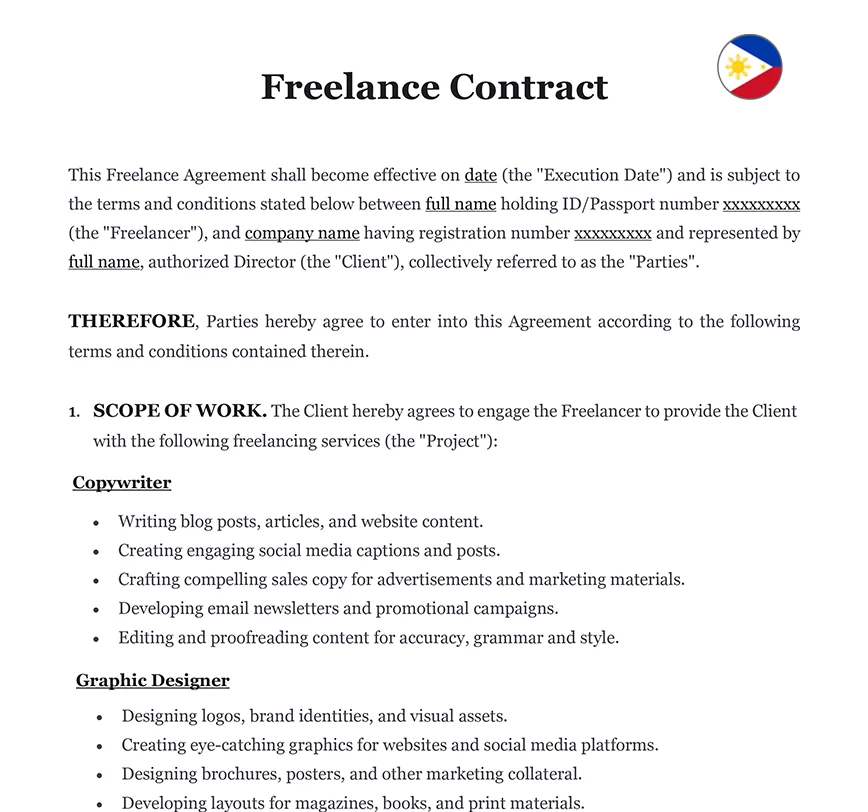Ready to use legal template
Drafted by experienced lawyers
Compliant with Filipino law
Ready to use legal template
Drafted by lawyers
Compliant with Filipino law
Home › Business contracts › Freelance Contract
Learn more about Freelance Contract in Philippines
Using freelance contracts in the Philippines offers numerous advantages for both freelancers and clients. Firstly, freelance contracts provide a clear understanding of the scope of work, deadlines, and payment terms, ensuring transparency and preventing any potential misunderstandings. These contracts also establish the legal framework for the working relationship, protecting the rights and interests of both parties involved. For freelancers, having a contract ensures they are compensated fairly and on time, while clients benefit from the assurance that the agreed-upon work will be delivered as expected. Additionally, freelance contracts in the Philippines help establish a professional image for freelancers, enabling them to build credibility and attract more clients.
Table of contents
-
What is freelancing and how does it work?
-
What should be included in a freelance contract?
-
When do you need a freelance contract?
-
How to set the duties and responsibilities of a freelance?
-
How to pay and invoice a freelancer?
-
How to protect sensitive information when hiring a freelancer?
-
How to terminate a Freelance Contract?
-
What if I don’t have a freelancer contract?
What is freelancing and how does it work?
Freelancing in the Philippines refers to a working arrangement where individuals offer their services on a self-employed basis to clients or companies. Freelancers in the Philippines work independently, providing specialized skills and services across various industries such as writing, graphic design, programming, virtual assistance, marketing, and more.
The process of freelancing in the Philippines typically involves several steps. First, freelancers showcase their skills and expertise through online platforms, personal websites, or professional networks. Clients looking for specific services then reach out to freelancers, either directly or through job postings.
Once a client and freelancer agree to work together, they negotiate the terms of the project, including the scope of work, deadlines, rates, and any additional requirements. It is common for freelancers to utilize freelance contracts to formalize the agreement and protect their interests.
During the project, freelancers work remotely, often from their own home or preferred workspace. They communicate with clients through various channels such as email, instant messaging, video calls, or project management tools. Freelancers are responsible for managing their own time, delivering high-quality work, and meeting the agreed-upon deadlines.
Upon completion of the project, freelancers typically submit their work to the client for review and feedback. If necessary, revisions or additional tasks may be requested. Once the client approves the final deliverables, freelancers issue an invoice for their services. Payments are often made through online platforms, bank transfers, or other agreed-upon methods.
Freelancing in the Philippines offers flexibility, the opportunity to work on diverse projects, and the ability to earn income based on one’s skills and expertise. It has gained popularity due to the increasing demand for remote work and the growth of online platforms connecting freelancers with clients worldwide.
What should be included in a freelance contract?
1. Scope of Work: Clearly outline the services the freelancer will provide, including the specific tasks, deliverables, and project milestones.
2. Duration of Engagement: Specify the start and end dates of the contract, or indicate if it is an ongoing engagement.
3. Payment Terms: Define the payment structure, including the rate, currency, and frequency of payment (e.g., hourly, fixed price, or retainer). Mention any upfront deposits or milestones required.
4. Intellectual Property: Address the ownership and usage rights of intellectual property. Specify whether the freelancer retains ownership or transfers it to the client upon completion of the project.
5. Confidentiality and Non-Disclosure: Include provisions to protect sensitive information shared during the engagement, prohibiting the freelancer from disclosing or using confidential information for purposes other than the project.
6. Revisions and Changes: Outline the process for requesting revisions or changes to the deliverables, including any additional fees or timeframes for such requests.
7. Termination Clause: Specify the conditions under which either party can terminate the contract, such as breach of terms, non-performance, or mutual agreement. Themis Partner provide you tools for termination such as Employee Warning Letter, Employment Termination Letter or Employee Performance Evaluation.
8. Dispute Resolution: Define the procedure for resolving disputes, whether through negotiation, mediation, or arbitration, and specify the jurisdiction or governing law.
9. Indemnification: State the responsibilities and liabilities of each party, ensuring that neither party is held responsible for the actions or omissions of the other.
10. Governing Law: Specify the laws of the Philippines that govern the contract, ensuring compliance with local regulations and jurisdiction.
When do you need a freelance contract?
A freelance contract in the Philippines is essential in various situations to safeguard the interests of both freelancers and clients. Whether starting a new project, engaging in long-term work, dealing with intellectual property, ensuring proper payment and compensation, maintaining confidentiality, or resolving disputes, a freelance contract establishes clear terms and conditions. It outlines the scope of work, project timelines, deliverables, and payment terms, providing a mutual understanding from the outset. By formalizing the agreement, freelance contracts promote professionalism, protect intellectual property rights, facilitate fair compensation, and offer a framework for resolving conflicts, ultimately ensuring a transparent and beneficial working relationship for both parties involved.
How to set the duties and responsibilities of a freelance?
1. Project Overview
Provide a brief description of the project, outlining its purpose, goals, and desired outcomes.
2. Specific Tasks and Responsibilities
Clearly define the tasks and responsibilities that the freelancer will be undertaking. Break down the project into specific deliverables and identify the associated tasks required to complete them.
3. Timeline and Milestones
Establish a timeline with specific deadlines for each deliverable or milestone. This helps to manage expectations and ensures that the project progresses smoothly.
4. Expected Deliverables
Outline the specific deliverables that the freelancer is expected to provide upon completion of the project or at specific milestones. These can include items such as completed designs, written content, website development, marketing materials, or any other tangible outputs relevant to the project.
5. Quality Standards
Specify the quality standards that the deliverables should meet. This may include factors such as accuracy, professionalism, adherence to brand guidelines, and any other specific requirements relevant to the project.
6. Revisions and Edits
Clarify the number of revisions or edits included in the contract and outline the process for requesting and implementing changes.
7. Communication and Reporting
Define the preferred communication channels and frequency of project updates or progress reports. This ensures that both the freelancer and the client are aligned and informed throughout the project’s duration.
8. Client Responsibilities
Clearly state any client responsibilities or requirements necessary for the freelancer to successfully complete the project. This could include providing access to certain resources, timely feedback, or any other collaboration needed from the client’s end.
How to pay and invoice a freelancer?
To ensure a smooth financial process for freelance contracts, it is crucial to establish clear and transparent procedures for payments and invoicing. This includes defining the payment terms, such as rates, currency, and accepted methods of payment. Additionally, establishing guidelines for invoicing, including the required details and format, helps maintain consistency. It is important to set timelines for invoice submission and payment due dates to ensure timely transactions. Having a policy in place for handling late payments, including any penalties or interest charges, is essential. Determining secure and convenient payment methods, such as bank transfers or online platforms, is also necessary. Keeping organized records of invoices, receipts, and payment confirmations aids in future reference and financial management. Communication with clients regarding payment matters is vital, and promptly addressing any issues or concerns that arise is essential for maintaining a healthy working relationship. By implementing these payment and invoicing guidelines, freelancers can facilitate prompt and accurate financial transactions for their contracts.
How to protect sensitive information when hiring a freelancer?
Confidentiality and non-disclosure measures for a freelancing contract in the Philippines typically include the following provisions:
| ➤ Confidentiality: The freelancer agrees to maintain the confidentiality of any proprietary or sensitive information disclosed by the client during the project. They commit to not disclosing such information to third parties without the explicit written consent of the client. |
| ➤ Non-Disclosure Obligation: The freelancer undertakes not to disclose any confidential information obtained during the project to anyone outside the scope of the project. |
| ➤ Use of Confidential Information: The freelancer agrees to use confidential information solely for the purpose of performing their obligations under the contract and not for personal gain or any unauthorized purposes. |
| ➤ Return or Destruction of Information: Upon completion or termination of the contract, the freelancer is obligated to return or destroy any confidential information provided by the client as instructed. |
| ➤ Scope of Confidentiality: The confidentiality obligations cover both the client's proprietary information and any other information the freelancer becomes aware of during the project that is reasonably considered confidential or proprietary. |
| ➤ Exclusions: The confidentiality obligations may exclude information that is already publicly available, known to the freelancer before the project, or rightfully obtained from a third party without any obligation of confidentiality. |
| ➤ Non-Competition: The freelancer may be restricted from engaging in similar work or providing services to competitors of the client for a specified period after the project's completion or termination. |
| ➤ Remedies for Breach: The contract may specify the remedies available to the client in case of a breach of confidentiality, such as injunctive relief, monetary damages, or other appropriate legal remedies. |




